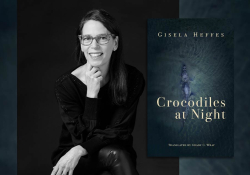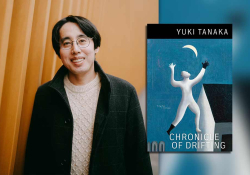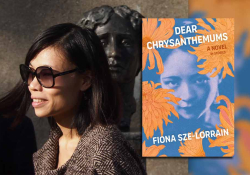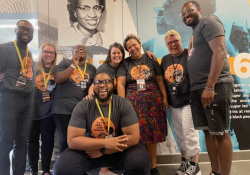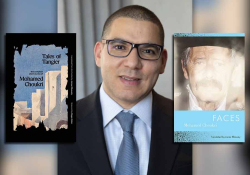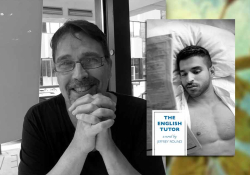Writing to Uganda: A Conversation with Jennifer Nansubuga Makumbi
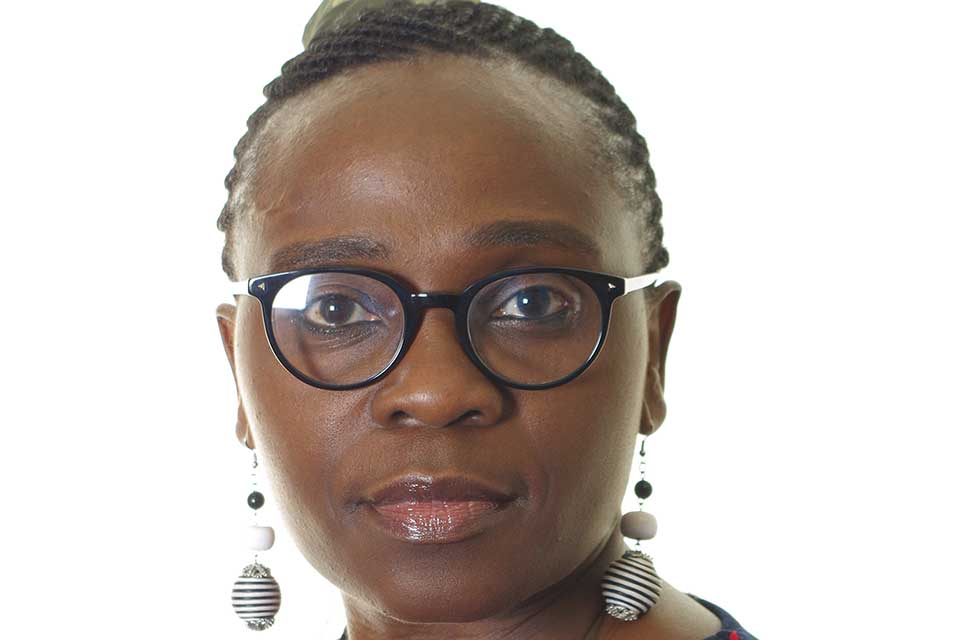
Ugandan novelist and short-story writer Jennifer Nansubuga Makumbi’s first novel, Kintu, won the Kwani Manuscript Project in 2013 and was longlisted for the Etisalat Prize in 2014. She was awarded the 2014 Commonwealth Short-Story Prize for her story Lets Tell This Story Properly, published by Granta, and the prestigious Windham-Campbell Prize for Fiction 2018 to support her writing. Her first full story collection, Manchester Happened, was published by Oneworld in May 2019. Retitled Let’s Tell This Story Properly, the collection was published in the US in July 2019. She lives in Manchester with her husband and son and lectures in creative writing at Manchester Metropolitan University.
While Makumbi was a fellow at the Alan Cheuse International Writers Center at George Mason University this past spring, she talked with Matthew Davis, the center’s founding director. Here they discuss how westerners and Africans read African literature differently, writing for Ugandans, and how eighteen years in England has changed her.
Matthew Davis: Jennifer, welcome. I want to start by discussing your novel, Kintu, which is in many ways a modern classic of world literature. It begins in 1750, when Kintu Kidda sets out for the capital to pledge allegiance to the new leader of the Buganda kingdom. The novel follows the descendants of Kintu as they struggle with a curse he unleashed as he made his way to the capital in the middle of the eighteenth century. So, I wonder if you can tell me about Kintu Kidda. Was he a mythological figure? In the book he is an actual character, but maybe you can describe a bit about the figure that is Kintu.
Jennifer Nansubuga Makumbi: Thanks for having me here. Kintu was first of all modeled on a mythological figure who was the first man on earth. So when I say Kintu in literature, all Ugandans know that we are going back to the beginning. However, the character that I use is actually not supposed to be mythical. But by the time we come to 2004, where the book ends, he sounds a bit more mythological than real. When you are in the 1750s, he is a father, he is a chief, he is a husband, he is a friend. And he is real and his problems are real. What I did with him, however, was place him around real kings that existed in real times, so perhaps that’s where, because he is put side-by-side with a mythological figure who was Kintu, the first man and also Kintu, the first king of Buganda—that is where perhaps he become a little bit of a myth, but I am quite happy with it.
Davis: Can you describe a bit how you began to write Kintu in terms of where you started with it and the process of writing the book? Did you start with the sections set in 1750 first, or did you have these characters set in the modern day that you were starting with? How did that process go?
Makumbi: Yes, I started with the patriarch, and I first wrote his story without placing it in time. And I went back to Buganda history and looked for the time that was most chaotic in terms of the kingdom, which would provide me with more drama. And I realized that there are three kings who were brothers who took power quite consecutively to each other, and the way they took power, I thought, “Okay, I will put Kintu in this place and in this time” and how then he relates to those kings. So he has his own story, where he is married to twin wives and likes one of them but does not like the other one. But at the same time, down in the capital, in Lubya, things are not going right. So that gave me great context in which to tell the story.
Davis: So then after we go to that historical period, we skip hundreds of years and we land, not in 2019, but in 2004, which is when the novel ends. Why did you decide to skip whole periods of Ugandan history, especially the colonial period?
I wanted people to look at my culture, to look at us.
Makumbi: That was intentional. That was a result of me having taught literature in the West and also studied literature there and seen how African texts are handled, especially Things Fall Apart in comparison to how we handled Things Fall Apart in Africa. And I realized that in the West, they focus so much on European action in Africa, if it’s there in your novel. So in Things Fall Apart, if you read it, the Europeans don’t arrive until much later in the text. Achebe’s handling of Okonkwo the father, Okonkwo the son, Okonkwo the husband: all that is ignored, and they just look at what Europe did, how we destroyed this culture. But I wanted people to look at my culture, to look at us. We’re beautiful, we’re ugly, we’re stupid, we’re clever, we’re very interesting. And that’s what I wanted to do, so I basically cut that chunk out. If you want to learn about colonization you can read it in history. But I was just going to focus on us. A Ugandan. You know, we started with Buganda kingdom, and we are now Uganda. However, when you come to the contemporary part, there are reflections that will tell you about colonization, because colonization is a self-perpetuating process, so you still find it without seeing white people there.
Davis: Yeah, you do. It’s a beautiful, wonderful novel. And it’s one that has been called the great African novel, and I wonder what your response is to something like that. How does that make you feel as a writer? Do you think that’s even possible in the sense of there being a great African novel? What is your reaction to that?
Makumbi: Yeah, um, first of all, I don’t react to that. I hardly read the reviews. I think, now that I have put out a second book, I’m going to go back and read the reviews. (Laughs) Because I was reading one of them this morning. Because I’ve been reading other people’s reviews of other books, I don’t tend to take these descriptors seriously. Especially when a book has just come out. I want to see what people will say about Kintu ten years from now or twenty years from now. And then I’ll know I’ve done something. Because these days you read a review and you’ve read a book, and you’re thinking, Hmm . . . I’m not so sure about that. So I don’t take the reviews of my books that seriously. As you know, people describe it the way they read it, but the way I wrote it was very different. It’s just a story to me. But nobody starts out to write a great novel; otherwise you fail. And I always argue that the beauty of the novel lies in the eyes of the beholder—should I say, “bereader”? (Laughs) They describe a novel like that, but I believe to most authors, this is just a story to tell.
I want to see what people will say about Kintu ten years from now or twenty years from now. And then I’ll know I’ve done something.
Davis: Let’s talk a little bit about the new short-story collection, Let’s Tell This Story Properly, which is a collection of stories that features Ugandans living and working in Manchester, England, some of whom are departing Uganda for Manchester, some of whom are returning from England back to Uganda. Your novel, Kintu, is solely based in Uganda, and here you have a lot of characters set overseas. What was the impetus for having characters set overseas, Ugandans living overseas, especially since they are not huge communities overseas?
Makumbi: One, it’s that desire to write back home that all expatriates or migrants or refugees carry with them. That idea that “Oh, I’m here” and connecting back home. So the whole collection for me is like a letter back home with a few pictures that I have enclosed for them to look at. So this is our life, this is how I’m living. Look at my Mercedes (laughs), look at my big house, or the opposite. But also the idea of home, that I still look at Uganda as home, but there are times, especially now that I am in the US, that I look at Manchester as home, and how home is transient, it keeps shifting. So I just wanted to write about this new place that I’m living in and tell Ugandans about it, how I see it. But also how we’ve created a tiny Uganda in Manchester, and I want to show them different Ugandans and how they are adapting or failing to adapt. But I also want Ugandans to see how, after twenty years, nineteen years, when we return, we return with the idea of home that we left behind, that which, when we return, has gone away and we fail to fit in and we are suddenly alien. Every time I go home my mother says, “Oh, the British one has returned.” (Laughs) But now here I insist I’m Ugandan, and then I go home and she calls me British. So with those dislocations, those shifting to and shifting back, I am trying to create what has been broken and failing.
I still look at Uganda as home, but there are times, especially now that I am in the US, that I look at Manchester as home, and how home is transient, it keeps shifting.
Davis: And then when you were writing these stories, what was the timeline for them, in terms of when the earliest one was written? Were you writing them while you were writing Kintu? How did these stories come about from beginning to end?
Makumbi: So in 2008, when I was writing Kintu, because Kintu is such a huge book, I was being mentored by Sara Maitland, and she said, “You know what . . . this is such a huge book, you’re going to fail to remember where it’s going when you hit the middle, so it’s best to write short stories along the way, because short stories are like, ‘Bum, bum, bum’—you know, opening, middle, ending, and that reminds you how a story curves,” so I started doing that, and I started with a story called “Malik’s Door.” And it took me four years to get that story right. I don’t even like it because of that. Because the short-story form is far harder to get right, and for me it’s about rhythms, rather than these curves of the story, so that took me a long time. And then I wrote “Our Allies the Colonies” (that title cracks me), and that was commissioned. But by then, I was honing the skill of writing it. I think I wrote that in 2011, but around 2013, I had finished Kintu. I had finished my first novel, which was rejected, and I hadn’t decided what I was going to do next, because you know, I hadn’t been published, but I had two books! (Laughs) I was crazy enough to carry on writing, because by then I had decided I was going to be poor anyway. So I joined a short-story writing group, where I had to submit a new short story every month, and that’s how I accumulated so many stories. But even then, I didn’t put them together as a collection. It was when Kintu got published and I realized that I could have a collection here. And after a quick read, I realized they could all be centered on Manchester but built around family structure, how families fall apart, how they fracture, how they reconnect, and how they remake themselves. And so I focused on that and put the collection together.
Davis: It’s really interesting to hear that initially you started to write stories as a way of helping you maintain the idea of a story arc while working on this large novel. And you’ve mentioned earlier how these stories are kind of letters to Ugandans, and that’s in keeping with your idea of an audience, the readers you are writing for. Now you’ve been here for a couple of months and have done a couple of events, including one at Solid State Books in Washington, DC. And I loved what you said during that talk: “We don’t have skyscrapers, but we have hills and we have slums, and that’s what I’m going to write and give to the world.” And that really, for me, synthesizes your idea of the readers you are writing for. So maybe you can talk a little bit about your audience. You’re not a Ugandan writer writing for the whole world or for Brits or Americans. You’re writing for Ugandans. Why is that important to you?
We are always writing about Africa, not to Africa. We are always telling the world about Africa. Like Africa has asked us to explain it to the rest of the world.
Makumbi: Well, it is important to me because I grew up reading African literature, and I studied African literature, and I taught African literature. And I quickly found out that Africans are not engaging with African literature except as a subject. African readers are more interested in American literature and other anglophone literatures but not our literature. That was because it was quite clear from the way we write our books that we are writing for the world or we are writing for the market that pays. So we are always writing about Africa, not to Africa. We are always telling the world about Africa. Like Africa has asked us to explain it to the rest of the world. And when Africans read those books, they are aware that you are not writing to them, because why would you explain their country or their culture to them. And it can be really irritating. The rest of the world doesn’t know how irritating this can be because nobody has done that to them. So American writers just write to Americans because, you know, the whole world understands them. So do the British. But when it comes to us we try to explain to Americans, “This is what I mean, this is what I’m doing.” Because we expect that they don’t understand our world, they don’t understand our culture.
And once I studied the nature of audiences for parts of my PhD, I decided, huh, this is where we are going wrong. And I don’t blame the African writers who write like that, because our publishers are in the West, and our editors and agents are here, and therefore they are catering for the markets out here. Nobody cares for the markets in Africa. But I thought we can change that. We can reengage with African readership. And actually, that is one of my activist thrusts, to reawaken the African market. Because it’s there; it’s just not engaged with our books. Just to reawaken them and say, “Hang on a minute, we are writing to you, we are writing to us.” And this gives you permission to hold an African novel and say, “I know what I’m talking about, I know what she’s doing, and I don’t like it. Or I love it. And I can say it.”
And so the books can be reviewed by Africans so that the West can look at the reviews that are being done in Africa. So I would like my books to be reviewed by Ugandans. But if the West is finding a way or failing to find its way through these books, then it can look to reviews from Uganda, from wherever. That’s really helpful. But also, as I told you, good literature looks at one audience, but when the book goes out into the world, every audience should be able to relate to that. It’s funny to go and say, “Oh, now I am thinking of American readers, now I am thinking of British readers, now I am thinking of Indian readers,” because those are the anglophone large markets. It can be difficult.
Davis: Western publishers wanted to publish a book that had Western characters in a novel about Africa, about Uganda. And you don’t have any Western characters in Kintu.
Makumbi: No, I don’t. But they also want the familiar themes, like war; if the book was totally concerned with war, totally concerned with poverty, and written in a way that is Euro-friendly. No.
Coming to the West for me has reawakened, just awoke the African in me.
Davis: So, I’m just curious—you are Ugandan, you were born in Uganda. And you’ve lived in England now for eighteen years. What does Uganda mean to you now? And what does being Ugandan mean to you know? And how has that changed at all given your time in England?
Makumbi: Well, when I was living in Uganda, and when I was in Uganda, I was just human, just a person. I didn’t really care about being African or black. I mean those things didn’t arise. And this is why I think you hear African authors say, “I didn’t know I was African until I came to the West.” They knew they were Africans, but there is an Africa that has been constructed in the West that you walk into and say, “Hang on a minute, who are those Africans? I didn’t know I was that African.” And so coming to the West for me has reawakened, just awoke the African in me. And if you read that short story “Manchester Happens,” where African intellectuals become militant, I became one of those, and I would get to a place, and the first thing I would say is, “I am African. Take me, I am African.” Because I know that here it is very embarrassing to be African. People are running away from being African. Where I am in your face, African.
And it made me quite nostalgic about Uganda. I started to love my culture. In the past, I didn’t care. I started to care about my language and how it is being cannibalized by English. I used to speak English properly; now I don’t anymore. It’s funny how the West has made me so militantly African and militantly Ugandan. And so this perhaps explains why I’ve gone for the oral traditions, because that’s where I am, that’s where my creativity, the history of creativity of my ancestors, that’s where it is. And that’s my well and the source that I draw from in terms of my inspiration and source of ideas.
So for most people who come to the West, they tend to become very westernized. I go home, and people say, “God, she’ s a radical traditionalist. Stay away from her.” (Laughs) You know? Last night I was talking to my aunt, who is in New York, and she was saying, “Yeah, Jennifer, we understand you love tradition, but . . .” (Laughs) And now when I go home people call me Nansubuga, which is my cultural name in terms of actually who I am, and not Jennifer, even though I am quite okay being called Jennifer. But yeah, that’s how England has changed me.
April 2019

